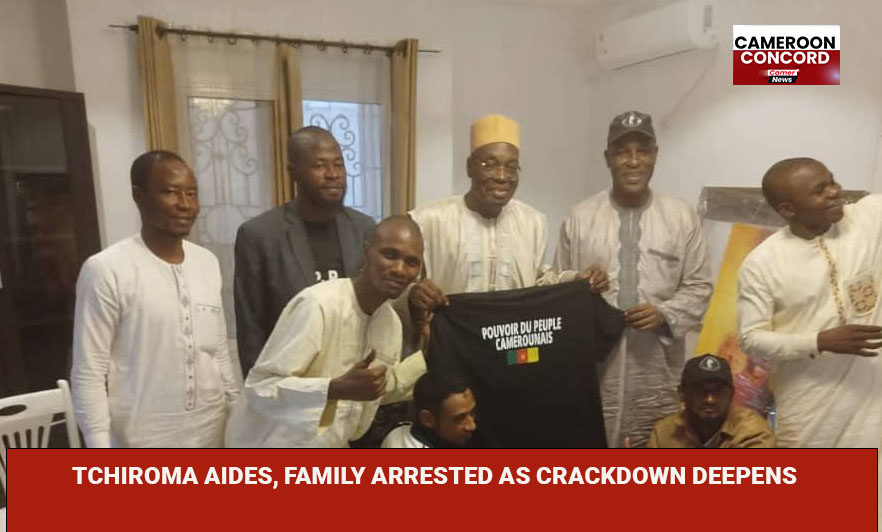- Details
- Headlines
Arrests, Assaults, and Fear Mark Cameroon’s Post-Election Crisis
[DOUALA, Nov 2, 2025] – Cameroon’s post-election unrest has entered a dangerous new phase marked by nationwide ghost towns, sweeping arrests, and international protests calling for an end to what many describe as a regime on its last legs.

From the usually crowded Marché Central in Douala to the deserted avenues of Yaoundé and Bafoussam, the three-day shutdown announced by President-elect Issa Tchiroma Bakary is being widely respected. Shops remain shuttered, transport halted, and security forces deployed in large numbers. The call for civil resistance, stretching from November 3 to 5, was coordinated with exiled journalists and bloggers, including Boris Bertolt, Paul Chouta, and Nzui Manto, who urged citizens to “stay home and stand firm.”
While the streets of Cameroon are silent, the diaspora’s voice has grown louder. Thousands of Cameroonians rallied in Paris, Ottawa, Berlin, and Nicosia on November 1 to denounce what they call “the stolen mandate of the people.” The Paris demonstration, held at Place de la République, marched toward the Élysée Palace demanding President Emmanuel Macron break his silence and acknowledge what protesters describe as “the legitimate victory of the third president of Cameroon, Issa Tchiroma Bakary.” Similar vigils were observed in Germany and Cyprus.
Inside Cameroon, repression deepens. Multiple reports confirm the arrest and deportation of demonstrators, journalists, and political activists. In Limbe, eyewitnesses counted over a hundred people rounded up by combined security forces. “They took everyone — parents, bike riders, even schoolchildren,” one resident told our correspondent. In Garoua, the residence of Issa Tchiroma’s family was raided and ransacked, with several relatives reportedly abducted.
Allegations of abuse continue to surface. Prominent lawyer Me Christian Ntimbane Mbono denounced the sexual assault of a detained protester by a gendarme at the Littoral Legion headquarters in Douala. “She identified her attacker, but no inquiry has been opened,” he said, calling on the Military Prosecutor’s Office to investigate. Civil society groups are now demanding accountability for what they describe as “systematic state violence.”
Church leaders have joined the chorus of condemnation. Archbishop Samuel Kleda of Douala reminded authorities that “democracy does not coexist with cannon fire, threats, or arbitrary arrests. One does not organize elections to kill citizens. You cannot govern a people with weapons.” His words, circulating widely on social media, echo growing frustration within religious and humanitarian circles over the government’s violent response.
At the political center of the storm, President Paul Biya, 92, is said to be in fragile health. Palace sources indicate that he has not appeared in public for two weeks and has requested travel authorization for medical treatment in Switzerland. According to insider reports, top aides — including his Chief of Cabinet, Samuel Mvondo Ayolo, and Secretary General Ferdinand Ngoh Ngoh — have insisted that he take the oath of office before leaving the country. Meanwhile, speculation mounts that Ngoh Ngoh is preparing a provisional government lineup featuring Felix Mbayu as Prime Minister and Francis Fai Yengo at External Relations.
Amid this uncertainty, the so-called “loyalist army” faction that escorted Issa Tchiroma to safety in Garoua has urged citizens to remain calm and avoid confrontation. The move has further fueled speculation of divisions within the military over the regime’s handling of the post-election crisis.
For the people on the ground, fear and defiance now coexist. In Douala, traders whisper about plainclothes agents monitoring compliance with government orders to reopen shops. In Yaoundé, posters calling for dialogue are quickly torn down by local administrators. Yet in every major city, the “Ville Morte” remains largely respected.
Across the diaspora, calls for solidarity continue. “Our people back home must know we are with them,” said one demonstrator in Paris holding the national flag drenched in rain. “The world is watching, and this time, silence is not an option.”
As the crisis stretches into its third week, Cameroon stands between repression and renewal. The streets are quiet, but the message is loud — the people refuse to surrender their future.
- Details
- News Team
- Hits: 1181
Local News
- Details
- Society

Kribi II: Man Caught Allegedly Abusing Child
- News Team
- 14.Sep.2025
- Details
- Society

Back to School 2025/2026 – Spotlight on Bamenda & Nkambe
- News Team
- 08.Sep.2025
- Details
- Society

Cameroon 2025: From Kamto to Biya: Longue Longue’s political flip shocks supporters
- News Team
- 08.Sep.2025
- Details
- Society

Meiganga bus crash spotlights Cameroon’s road safety crisis
- News Team
- 05.Sep.2025
EditorialView all
- Details
- Editorial

Robert Bourgi Turns on Paul Biya, Declares Him a Political Corpse
- News Team
- 10.Oct.2025
- Details
- Editorial

Heat in Maroua: What Biya’s Return Really Signals
- News Team
- 08.Oct.2025
- Details
- Editorial

Issa Tchiroma: Charles Mambo’s “Change Candidate” for Cameroon
- News Team
- 11.Sep.2025
- Details
- Editorial





